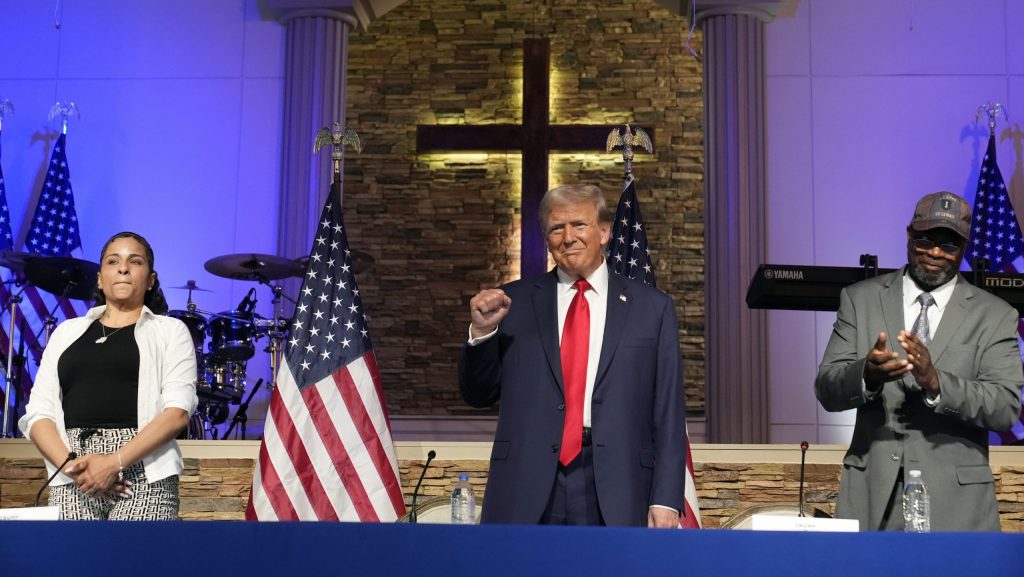Created Equal: A look at Republican efforts to court Black and Latinx voters
Madison Ganzak June 27, 2024Ahead of Thursday’s debate between former President Donald Trump and President Joe Biden, five guests joined the show to discuss the role voters of color will play in the 2024 election.

Republican presidential candidate former President Donald Trump arrives to speak at a campaign event at 180 Church, Saturday, June 15, 2024, in Detroit, as Itasha Dotson and Carlos Chambers listen.
The first debate between former President Donald Trump and President Joe Biden this election cycle is coming up tonight, airing at 9 p.m. Thursday on CNN and streaming here at wdet.org.
Only 5% of Black voters in Detroit cast ballots for Trump in 2020, and earlier this month, the former president made a campaign stop at 180 Church in Detroit in an attempt to appeal to both Black and Latinx voters.
Lorenzo Sewell, lead pastor at 180 Church, joined Created Equal on Thursday, along with four other guests, to discuss the Republican Party’s need to attract Black and Latinx voters and whether the messaging to attract them is genuine.
Subscribe to Created Equal on Apple Podcasts, Spotify, Google Podcasts, NPR.org or wherever you get your podcasts.
Guests
Lorenzo Sewell is a senior pastor at 180 Church, which hosted former President Trump for a campaign event earlier this month. While Sewell said he never invited Trump into his church, he is still grateful he came because he believes everyone is welcome in his church.
“He asked to come to a praying church, and I thought it was a joke,” said Sewell. “Thats well noted, and I do believe that anyone is able to come to the house of God, whether you have 34 convictions or not because the Bible says he who has not sinned let them cast the first stone, so anyone is able to come to the house of God, specifically a politician to have the church pray and to listen to them.”
Mara Ostfeld is an associate research scientist in the Ford School of Public Policy at the University of Michigan. Ostfeld says she believes that every voter in this country deserves to be appealed to by multiple parties, but explained how the Republican Party has ignored Black and brown voters.
“There should be some efforts, there should be some Black and brown outreach,” said Ostfeld. “We know that hasn’t really manifested itself, we know that Black and brown voters are less likely to be contacted by campaigns until the last weeks before the election, so it’s great to see parties making any effort.”
Mason Holland is a graduate student in the political science Ph.D. program at the University of Michigan. Holland says he thinks Black voters want to be spoken to, addressed, and appealed to at the end of the day, and that Trump will not be able to do very much to deviate the messages he has already put out.
“Reaching out never hurts,” said Holland. “The people that support him are going to continue to support him, and I think he still has the potential to pull off a few undecideds, who really can detruncate between the two parties, although I think we would also agree that there is a difference between the two parties qualitatively. They can still be swayed.”
Zoe Walker is a Ph.D. candidate in the political science department at the University of Michigan. Walker said when it comes to Trump coming to a city like Detroit to try to attract Black voters, he is not messaging the same way he does in other states and cities.
“He can sort of play this political game of ignoring the racist rhetoric that he used to describe “election fraud” in 2020, and pivot saying he is going to bring jobs and opportunities to Detroit, and hearing those words is really compelling,” said Walker.
Listen to Created Equal with host Stephen Henderson weekdays from 9-10 a.m. ET on 101.9 WDET and streaming on-demand.
